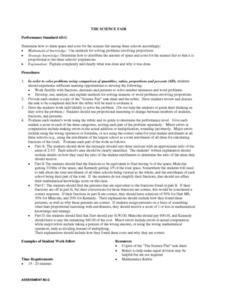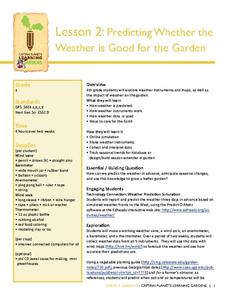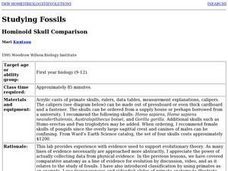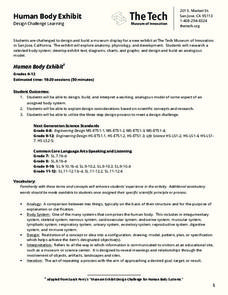Curated OER
A Creative Classroom Model For a Sixth Grade Science Class
Sixth graders observe with a microscope such simple crystals as salt, sugar, cream of tartar, and other chemicals which are listed in detail. They observe the crystalline structure and make comparisons, culminating in the creation of...
Teach Engineering
What is a Nanometer?
Teams learn about the size of a nanometer by measuring objects and converting those measurements. A worksheet then tests the groups' abilities to use nanometers by having them determine the size of objects that are too small to measure.
Howard Hughes Medical Institute
Biodiversity and Evolutionary Trees
Compare what shells look like on the outside with what makes that happen on the inside. Scholars begin by sorting an various seashells by their physical characteristics into phylogenetic trees. They then conduct a DNA comparison of...
LABScI
Electrolysis: Splitting Water
Explore the chemical components of water through an electrolysis reaction. Scholars use a battery to divide various water solutions into different gases. As they collect the gases, they measure the volume and make a comparison to the...
Children’s Hospital of Philadelphia
The Innate Immune System
My body is my castle. Pupils learn about the innate immune system in the second lesson plan of a three-part unit on the immune system by comparing the innate immune system to a castle and moat. Groups conduct a simulation where they try...
Curated OER
A Comparison of Polymeric Liquids with Newtonian Liquids
Students concretely illustrate and define a macromolecule, observe the unique behavior of polymers and relate to their knowledge of molecules, and use the scientific process to determine the difference between Newtonian and non-Newtonian...
Curated OER
Science Fair Space
Students determine the most equitable way to share space and cost between three schools for a fictional science fair. Given a diagram, a word problem, and a data set, students analyze and explain the best way for all schools to share...
Curated OER
Smart Consumers, Smart Choices
High schoolers see what it means to be a smart consumer by engaging in a level-headed analysis of budget, opportunity costs and self-regulation. They compare prices within a service field, and weigh the choices of spending money on that...
Curated OER
Making It Balance
Students listen to story, "The 100-Pound Problem," compare their weight with character in story, and weigh different classroom items using nonstandard units and standard units. They experiment with different items that can make scale...
Howard Hughes Medical Institute
EarthViewer
Can you imagine Washington DC and London as close neighbors occupying the same continent? Learners will be fascinated as they step back in time and discover the evolution of the earth's continents and oceans from 4.5 billion years ago to...
Captain Planet Foundation
Predicting Whether the Weather is Good for the Garden
Can your class predict the weather? Show them how they can come close with a lesson about creating weather instruments, including weather vanes, barometers, wind socks, anemometers, and thermometers. Kids research weather patterns and...
Curated OER
Carbon Dioxide Heats It Up
Young scholars design an investigation to test whether vegetation in an area helps regulate the ambient air temperature. They make comparisons between the investigation and global changes in climate. In groups, they present their...
Curated OER
Heart as a Pump
Students explore the working of the heart by making comparisons with the actions of a pump. They find examples of pumps and valves in facets, aerosol sprays, automobile fuel pumps, and many household items in daily use.
Curated OER
Tree Comparison/Contrast Project
In this trees worksheet, students put different kinds of trees into a chart and compare and contrast them. Students then answer percentage problems about the trees and short answer questions. Students complete 7 questions in all.
Curated OER
Studying Fossils: Hominoid Skull Comparison
Students collect data on the differences in Hominid skulls using acrylic casts of fossil skulls. They measure a series of structures on skulls from six different species then use the data to determine evolutionary relationships between...
Curated OER
The Perfect Pet
Students take on role of an associate in a pet shop and help imaginary customers compare pets for sale.
Computer Science Unplugged
Lightest and Heaviest—Sorting Algorithms
How do computers sort data lists? Using eight unknown weights and a balance scale, groups determine the order of the weights from lightest to heaviest. A second worksheet provides the groups with other methods to order the weights. The...
Intel
Energy Innovations
Collaborative groups examine the importance of energy resources on quality of life by researching different energy sources and alternative energy sources through data analysis. They make a comparison of different countries and cultures,...
ReadWriteThink
Webcams in the Classroom: Animal Inquiry and Observation
Boost observational skills with an inquiry-based lesson that takes scholars on a virtual field trip. With help from webcams, learners observe animals in a zoo or aquarium. Observations go into a journal and a discussion is held to review...
National Christmas Tree Association
Merry Christmas, Geraldine
If you're reading the story "Merry Christmas, Geraldine" by Holly Keller, this is a fantastic cross-curricular resource to use. Complete with activities for language arts, science, social studies, art, and math, you'll get the most out...
Noyce Foundation
Truffles
Knowing how to scale a recipe is an important skill. Young mathematicians determine the amount of ingredients they need to make a certain number of truffles when given a recipe. They determine a relationship between ingredients given a...
Curated OER
How hard is it?
Inquiry is probably one of the most fun ways kids learn. They will test the hardness of 10 different minerals in order to classify them. They rate each of the minerals from most to least hard. Note: Having real minerals for this...
Tech Museum of Innovation
Human Body Exhibit
Explore human anatomy and physiology using models. Scholars study systems of the human body and design a display for a museum exhibit. To complete the activity, individuals create analogous models of their chosen human body systems.
Howard Hughes Medical Institute
What van Leeuwenhoek Saw
When van Leeuwenhoek saw cells and single-celled organisms for the first time, he knew these small things were a big deal! Share his discoveries with young learners through a narrated video, model-building activity, and scale study....

























